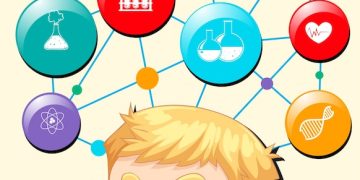Choosing the Right College Major: Careers in Demand 2025

Choosing the right college major involves self-assessment, exploring career options, and aligning your skills with high-demand fields like technology, healthcare, and data science, ensuring a fulfilling and financially stable career path beyond 2025.
Are you feeling overwhelmed by the prospect of choosing a college major? Don’t worry, you’re not alone! This the ultimate guide to choosing the right college major: aligning your skills with high-demand careers in 2025 is designed to help you navigate this crucial decision and set yourself up for success in the future workforce.
Understanding Yourself: Skills and Interests
Choosing a college major is a significant step towards shaping your future career and life. It’s not just about picking a subject you find interesting; it’s about aligning your skills and interests with a career path that offers both personal fulfillment and professional opportunities. Let’s delve into the importance of self-assessment in this process.
Self-Assessment: The Foundation of Decision-Making
Before diving into potential majors, take some time to understand yourself. What are you good at? What do you enjoy doing? Identifying your strengths and passions is crucial in making an informed decision.
Identifying Your Skills and Interests
Consider activities that you find engaging and fulfilling. They may be academic, artistic, athletic, or related to hobbies or volunteer work. What skills do these activities require, and which ones do you enjoy using?
- Take online aptitude tests to discover your strengths.
- Reflect on past experiences where you excelled and felt challenged.
- Talk to friends, family, and mentors about your perceived strengths.
By understanding your skills and interests, you can begin to narrow down the vast array of college major options available to you. This self-awareness will serve as a compass, guiding you toward a path that aligns with your innate abilities and passions.
Ultimately, knowing yourself is the first step towards making a choice that sets you on a path towards a meaningful and successful future. This understanding forms the bedrock for a college experience that suits your unique talents and prepares you for high-demand careers.
Exploring High-Demand Career Fields in 2025
The job market is constantly evolving, with new industries and roles emerging all the time. Staying informed about high-demand career fields will help you choose a college major that leads to promising career prospects. Let’s take a look at some of the fields that are expected to be in high demand in 2025.
Technology: The Driving Force
Technology continues to be a dominant force in the job market. Roles in software development, data science, cybersecurity, and artificial intelligence are expected to grow significantly. A degree in computer science, information technology, or a related field can open doors to numerous opportunities.
Healthcare: A Growing Need
With an aging population and advancements in medical technology, the healthcare industry is experiencing significant growth. Nursing, medical assisting, physical therapy, and healthcare administration are just a few of the roles in high demand. Degrees in nursing, pre-med, or health sciences can pave the way for a rewarding career in healthcare.
Data Science: Unlocking Insights
Data science is a rapidly growing field that involves collecting, analyzing, and interpreting large datasets to help organizations make informed decisions. A degree in statistics, mathematics, or computer science can lead to a career as a data scientist, data analyst, or business intelligence analyst.

Staying informed about these high-demand career fields will empower you to make strategic decisions about your college major. Choosing a path that aligns with these growing industries will increase your chances of securing a fulfilling and financially rewarding career.
Matching Majors to Career Paths
Once you have a better understanding of your skills, interests, and high-demand career fields, the next step is to match potential majors to specific career paths. This process involves researching different majors and exploring the types of jobs they can lead to. Let’s find out how to connect your academic pursuits with promising future careers.
- Research different majors and their corresponding career options.
- Explore internships and shadowing opportunities to gain real-world experience.
- Network with professionals in your fields of interest to learn about their career paths.
STEM Majors and Their Career Connections
Majors in science, technology, engineering, and mathematics (STEM) often lead to high-paying and in-demand careers. Engineering majors, such as mechanical or electrical engineering, typically work in designing and developing solutions to technical problems.
Humanities and Arts Majors and Their Career Connections
Majors in the humanities and arts can lead to careers in fields such as education, journalism, communications, and the arts. English majors may find work as writers, editors, or content creators, while history majors may pursue careers in teaching or museum curation.
By taking the time to thoroughly research different majors and their corresponding career paths, you can make a more informed decision about your academic pursuits. This proactive effort will help ensure that your education aligns with your career aspirations.
Matching your skills to specific career paths allows for a more targeted approach to your education. It ensures that your coursework and extracurricular activities are directly relevant to your desired field, enhancing your preparedness for the professional world.
Considering Future Trends and Industry Changes
The world is constantly changing. Industries evolve, new technologies emerge, and job markets shift. When choosing a college major, it’s crucial to consider these future trends and industry changes. Let’s understand the foresight needed when making these important academic decisions.
The Impact of Artificial Intelligence
Artificial intelligence (AI) is rapidly transforming industries across the board. While AI is expected to automate certain tasks, it will also create new opportunities in areas such as AI development, data analysis, and AI ethics. Majors that combine technical skills with critical thinking and problem-solving abilities will be highly valuable.
The Rise of Sustainability
With growing concerns about climate change and environmental sustainability, there is an increasing demand for professionals who can develop and implement sustainable solutions. Majors in environmental science, renewable energy, and sustainable business practices are becoming increasingly relevant.

Accounting for future trends and industry shifts will enable you to make resilient choices about your college major. This proactive approach ensures that your education doesn’t merely prepare you for today’s job market but also positions you favorably for tomorrow’s.
By understanding the potential impacts of AI and sustainability, you can adapt your educational and career goals to align with these evolving trends. This foresight will not only future-proof your career but also empower you to contribute meaningfully to these emerging fields.
Getting Practical Experience: Internships and More
While academic knowledge is important, gaining practical experience through internships, volunteer work, and other extracurricular activities is just as important. Practical experience allows you to apply your knowledge in real-world settings, develop valuable skills, and network with professionals in your field. Let’s highlight the importance of hands-on experience.
The Benefits of Internships
Internships provide students with the opportunity to work in a professional setting, gain hands-on experience, and learn from experienced professionals. Internships can also help students clarify their career goals and build their resumes.
Other Ways to Gain Practical Experience
In addition to internships, consider volunteer work, part-time jobs, and participation in student organizations. These activities can help you develop valuable skills, such as teamwork, communication, and leadership.
- Research internships in your field of interest.
- Attend career fairs and networking events.
- Seek out volunteer opportunities that align with your skills and interests.
Having practical experience complements your academic knowledge, providing a well-rounded skill set that employers highly value. It bridges the gap between theoretical learning and real-world application, making you a stronger candidate when you enter the job market.
Taking initiative in gaining practical experience demonstrates your commitment to your chosen career and enhances your ability to adapt to workplace environments. This experience not only sets you apart from other candidates but also gives you a clearer sense of your career aspirations.
Making the Final Decision and Staying Flexible
Choosing a college major is a big decision, but it’s not set in stone. It’s important to make an informed choice based on your skills, interests, and career goals, but it’s also important to stay flexible and open to new possibilities. Let’s delve into the decision-making process, emphasizing the value of flexibility and adaptability.
Trusting Your Gut
After careful consideration and research, trust your gut. Choose a major that excites you and aligns with your values. Remember, you’re more likely to succeed in a field that you’re passionate about.
Staying Open to Change
Don’t be afraid to change your major if you discover that it’s not the right fit for you. Many students change their majors at least once during their college careers. College is a time of discovery, and it’s okay to change your path as you learn more about yourself and the world around you.
Making the final decision is an act of confidence in your self-assessment and exploration. Combined with an openness to change, this decision-making process empowers you to pursue a path that remains aligned with your evolving interests and aspirations.
Staying flexible and open to change is crucial because the career landscape is dynamic and unpredictable. Adapting to new opportunities and challenges enables you to make the most of your college experience and sets you on a path of continuous growth.
| Key Point | Brief Description |
|---|---|
| 💡Self-Assessment | Identify your strengths and passions. |
| 📈Career Fields | Explore growing areas like tech and healthcare. |
| 🤝Practical Experience | Gain experience with internships and volunteer work. |
| 🧭Flexibility | Stay open to changing your major if needed. |
FAQ
▼
Very important! Knowing which fields are growing can help you choose a major with excellent career prospects. For example, technology and healthcare are consistently in high demand.
▼
That’s okay! Take aptitude tests and explore different subjects in college. Internships and volunteering are great ways to discover your strengths and passions.
▼
Absolutely! Many students switch majors. College is about discovery. Don’t feel stuck if your interests or career goals change along the way.
▼
Internships provide real-world experience, allowing you to test your interest in a particular field. They also develop skills and build your professional network, ensuring career readiness.
▼
AI is transformative. While some jobs may be automated, new roles will emerge in AI development, data analysis, and AI ethics. Stay informed about this evolving technology!
Conclusion
Choosing the right college major is a personal journey that requires self-reflection, research, and a willingness to adapt, as highlighted in the ultimate guide to choosing the right college major: aligning your skills with high-demand careers in 2025. By aligning your skills and interests with high-demand career fields, and by staying flexible to navigate future trends, you can position yourself for a fulfilling and successful future.





